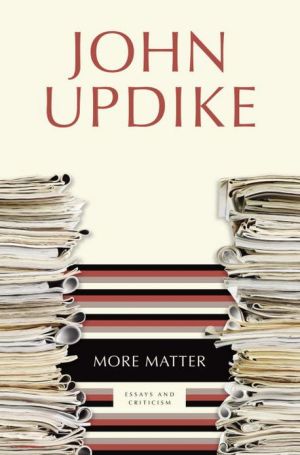
More Matter: Essays and Criticism PDF
Preview More Matter: Essays and Criticism
Ever since he made his two-pronged prose debut in 1959 with The Poorhouse Fair and The Same Door, John Updike has delivered approximately one work of fiction per year. Few modern novelists have approached this level of productivity, which suggests a kind of late-Victorian stamina and linguistic lust for life. Even fewer have simultaneously churned out, as Updike has, a constant stream of reviews, essays, reminiscences, and occasional pieces. His custom is to collect this abundance every decade or so, disguising the substantial nature of these volumes with throwaway titles like Picked-Up Pieces and Odd Jobs. The latest such cornucopia is More Matter--and, like its predecessors, this 928-page behemoth reminds us that Updike is among our most discerning and omnivorous critics.
His title, this time, echoes Queen Gertrude's editorial advice to Polonius: "More matter, with less art." Only reluctantly does Updike assent to our age's appetite for facts, facts, and more facts, with fiction relegated to a kind of imaginative finger bowl:
Human curiosity, the abettor and stimulant of the fiction surge between Robinson Crusoe's adventures and Constance Chatterley's, has become ever more literal-minded and impatient with the proxies of the imagination. Present taste runs to the down-home divulgences of the talk show--psychotherapeutic confession turned into public circus--and to investigative journalism that, like so many heat-seeking missiles, seeks out the intimate truths, the very genitals, of Presidents and princesses.
Strong stuff, that last line, especially from the man whom Nicholson Baker called "the first novelist to take the penile sensorium under the wing of elaborate metaphoric prose."
But if Updike's critical investigations tend to stay above the belt, they remain as wide-ranging and elegant as ever. In More Matter, he takes on Herman Melville and Mickey Mouse, Abraham Lincoln and the male body--not to mention the cream of modern cosmology. His formulations on almost any subject seem ripe for the commonplace book. Here he is on sexual appetite: "Lust, which begins in a glance of the eye, is a searching, and its consummation, step by step, a knowing." On the short story: "The inner spaces that a good short story lets us enter are the old apartments of religion." On the austerity of biblical narrative: "The original Gospels evince a flinty terseness, a refusal, or inability, to provide the close focus and cinematic highlighting that the modern mind expects." And finally, on the raw intimacies of John Cheever's published journals:
His confessions posthumously administer a Christian lesson in the deep gulf between outward appearance and inward condition; they present, with an almost unbearable fullness, a post-Adamic man, an unreconciled bundle of cravings and complaints, whose consolations--the glory of the sky, the company of his young sons--have the ring of hollow cheer in the vastness of his dissatisfaction. Comparatively, the journals of Kierkegaard and Emerson are complacent and academic.
These sentences neatly unite the author's literary and theological concerns--although the latter topic takes something of a back seat in More Matter--and remind us of the compound pleasures of his prose. In his preface, Updike refers to the book as "my fifth such collection and--dare we hope?--my last." We very much hope not. --James Marcus
From Publishers WeeklyMany American writers this century have been called brilliant and accomplished, but Updike is the real thing, as this huge collection of personal essays, social commentary, book reviews, introductions, interviews and occasional pieces amply attests. It is astonishing that a volume of nearly 200 piecesAmost written for such intellectual venues as the New Yorker and the New York Review of Books, but some penned for the mass audiences of Newsweek and USAir MagazineArepresents only eight years' work at a time when Updike was producing roughly a novel every two years. But perhaps even more surprising is his range, depth and originality. Segueing freely from the latest biography of F. Scott Fitzgerald and the nature of evil to cars, cartoons and burglar alarms, these essays are bursting with sentiments and observations that defy ideology or neat categorization. Just when you think Updike is a cultural conservative (he deems young men's haircuts "hostile," mocks Borges and debates the serial comma), he defends Jacques Derrida (against Camille Paglia, no less). Just when you think he is refined and cautious (shaving the metaphysical line between "freedom" and "equality"), he turns irreverent (referring to Helen Keller jokes and "God in a lilac shortie nightgown" on the ceiling of the Sistine Chapel). Some pieces are prophetic, such as his comments in 1996 on our fascination with the Titanic disaster. Unlike most journalism, Updike's occasional writing is so exquisite as to repay multiple readings. And not least among the many virtues of this book, the 50th of his career, is its sheer fact of convenient assembly. BOMC alternate selection. (Sept.)
Copyright 1999 Reed Business Information, Inc.
